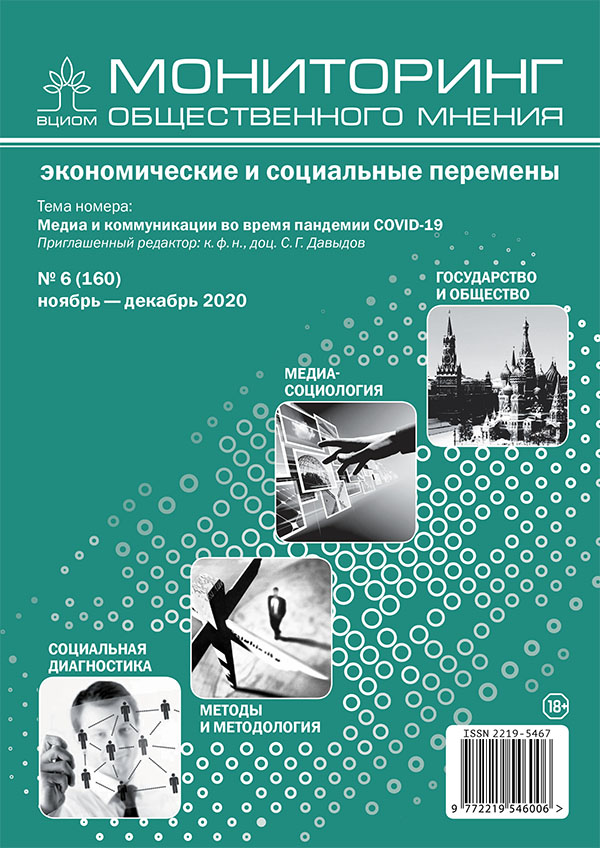Почему не верят опросам, или Как фреймируются результаты опросов общественного мнения в современных российских СМИ
DOI:
https://doi.org/10.14515/monitoring.2020.6.1683Ключевые слова:
медиафреймирование, фрейм-анализ, анализ медийных сообщений, опросы общественного мнения, недоверие, проводники, посредники, фреймирующие машины, акторно-сетевая теорияАннотация
Статья посвящена изучению фреймирования результатов опросов общественного мнения в современных российских СМИ как не заслуживающих доверия, а также распределения ролей в медийных сообщениях между опросными компаниями и СМИ как между двумя фреймирующими машинами. Исследование проведено при помощи фрейм-анализа на материалах медийных сообщений (N = 3035) с использованием базы данных «Медиалогия» за период с 2009 по 2019 гг. Традиционно результаты опросов общественного мнения привлекаются при проверке эффективности используемых фреймов, в данной статье они рассматриваются как медийно фреймируемая информация. Автор выделяет четыре варианта представления результатов опросов в СМИ по осям «доверие — недоверие» и «скрытое — явное», где тексты с недоверием к результатам опросов составляют четвертую часть выборки. В статье проанализированы и проиллюстрированы фреймирующие технологии, при помощи которых СМИ производят недоверие к опросам. Опираясь на традиционное для акторно-сетевой теории различение на «проводников» и «посредников», автор показывает, что СМИ описывают работу опросных компаний таким образом, чтобы все возможные поломки относились к их работе, тогда как работа самих медийных площадок оказывается скрытой. Представляя определенным образом результаты опросов и выступая, по сути, посредниками, СМИ фреймируют как посредника опросную компанию, а себя — как проводника.
Благодарность. Исследование выполнено при поддержке стипендиальной программы Oxford Russia Fellowship 2019-2020. Автор выражает признательность А. С. Титкову и В. С. Вахштайну за комментарии и замечания, которые позволили сделать текст лучше.
Загрузки
Опубликован
Как цитировать
Выпуск
Раздел
Лицензия
Copyright (c) 2020 Мониторинг общественного мнения: экономические и социальные перемены

Это произведение доступно по лицензии Creative Commons «Attribution-NonCommercial-ShareAlike» («Атрибуция — Некоммерческое использование — На тех же условиях») 4.0 Всемирная.






